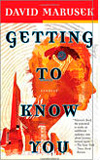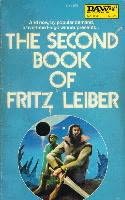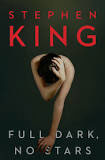
Getting to Know You, by David Marusek
Book Review by James Michael White
Have you read this book?
If technologically advanced futures rendered completely sterile and
impersonal by w?nder-gadgets (mostly really smart
take-with-you-everywhere computers) is your cup of soybimi tea, you'll
just dig the dickens out of David Marusek's eleven tales of future
wangst in Getting to Know You. A common theme running through many of
the stories is one of increasing depersonalization, in which the future
of mankind is increasingly less about mankind and more about the drive
to technological efficiency that renders them obsolete.
Marusek depicts a future in which physical decrepitude is rejuvenated (if you're wealthy, and you're only wealthy if you're really useful, which most often seems to mean, "completely willing to toss anyone under the first passing bus"), procreation has largely ceased, strange and empty socio-political rituals have replaced meaningful human interaction, the easy and self-serving choices are more often in evidence than the noble, technology is invasive and pervasive, and we're just as often reading about human simulacra as we are characters who, for apparently having all their humanity rubbed out, might just as well be.
In this sense the stories come off a bit Philip K. Dick-ish, but as if the latter had ignored Graham Green's admonition that "cynicism is the easiest thing in the world." The resulting tales are largely bleak, brittle, cynical ones forewarning antiseptic dystopian despair mirroring, in their own way, some Player Piano-esque Vonnegutian concerns about modern technology, but without the satisfaction of the big V's will-to-chaos con brio promising the beat of wild and human heart, even if only a solitary one. Instead, we get tales so aloof in their telling that it's extremely difficult to care about what's going on and, instead, find ourselves mired in boredom, experiencing a kind of future tedium akin to listening to Milton, that Office Space guy, ramble on about the virtues of Swingline staplers.
Two exceptions stand out, however. One of them is very funny, the other very cynical, though of a kind that invites snickers both of recognition of its targets and their deserved derision. But for those two saving graces, this book would have gone straight into the rubbish bin. If you want to read the interesting stories, look at "Yurek Rutz, Yurek Rutz, Yurek Rutz" (that's the funny one), and "VTV."
The Wedding Album
Rating: 5
Fans of Star Trek: The Next Generation know all about holodeck episodes, and here's one, here, in which a married couple's angsty relationship plays out in the recorded holographic images of their wedding. Oh but the trick, see, is that these holograms do not at first know that's what they are, nor do we readers. Projecting no warmth whatsoever, the dramatic concern at the center of this story (a wife losing her mind), once pressed through the filter of simulation, comes across as hopelessly artificial.
The Earth is on the Mend
Rating: 4
Did I mention vignettes, earlier? Here's one, and it doesn't really pass the SF test in which we ask ourselves: What is the underlying science (we'll be generous and use the broader "speculative fiction" term), and does the story still work, even with that element removed? The underlying speculation is that civilization has broken down and regressed to something primitive and tribalistic up in the cold north and this guy, finding a family sheltering together in a small encampment, considers killing them while muttering prophetically, "It means the earth is on the mend." Well, fine and dandy, but you have to read deeply into these tea leaves to get any of that about broken civilization. After all, this could just be an account of some nutball who's spent too much time alone.
Yurek Rutz, Yurek Rutz, Yurek Rutz
Rating: 10
A story of wit and substance, told in query-letter style, Marusek shows up as a character commissioned to write an epitaph -- one suitable for engraving upon a giant block of stone -- for a guy who wants his name to survive into immortality. And he wants it to survive in a kind of Donovan's Reef Hawaiian myth way, the one that John Wayne spoke of when he said that the dead lived as long as we remembered their names. Speculating upon the human desire for permanence in an impermanent world, here's a story whose very humanity and abiding charm deserves to be remembered.
A Boy in Cathyland
Rating: 5
Bearing no real distinctiveness of plot, theme, characterization or style, this little story ticks metronomically along the deep ruts of a future in which high tech has become outlawed and those possessing it can be summarily executed. Thusly juxtaposing a hinted-at past of high technology against an agrarian present, the story almost asks us to consider whose humanity has been lost in this seeming cultural regression. Is it the state apparatus, personified by the "dumification patrol" come to spy upon the peasants, or is it the successful gardener with a high tech secret?
We Were Out of Our Minds With Joy
Rating: 2
If the primary virtue of a story is that it be entertaining, this one fails. Oh it isn't badly written, and it doesn't lack for something to say, but if ever a literary endeavor was not my cup of tea, then this novella -- a tedious tackling of artistic warmth vs. techy (and political) coldness -- certainly is. In this future, human rejuvenation has brought an end to procreation but for certain limited exceptions. Our intrepid hero, the warm and fuzzy artiste, Sam Harger, hooks up with a political and ultimately chilly multinational prosecutor, Eleanore Starke. They want to have a baby. They want to have a relationship. The nature of their evolving relationship is used as a vehicle to explore and comment upon a future ethos of depersonalization rejected by one and embraced by another (a recurring trend in these stories). But it's all so sort-of and distant seeming, so afflicted by an ethos of indifference that, well, I don't care.
VTV
Rating: 9
A journalist who has built his reputation upon shock and sleaze stakes out the home of an assassin's target for an exclusive scoop and finds himself not merely reporting the story, but becoming increasingly involved in it. Efficiently excoriating the worst impulses of mass media, VTV also manages to comment upon "the people's right to know" and the power of corporate purse strings to affect what they know.
Cabbages and Kale or: How We Downsized North America
Rating: 5
A story about a future procreation ban and the guy who holds the deciding vote, this one pits what the fellow thinks he knows about himself against what a simulacrum of himself thinks he knows. As one might guess, philosophical viewpoints differ, and it's for this difference personal and political conflicts arise upon the eve of the important vote. But, like a mild bout of indigestion, conflict flares and dies with nary a rumble. Aloofness of prose and an inability to generate real concern for characters or events keeps any of it from being deeply felt.
Getting to Know You
Rating: 6
Zoranna, enjoying all the success of one who gets to test new things, is shocked and appalled when visiting her younger sister to discover her decrepit with age, living in a substandard apartment, victimized by a live-in shyster. In her attempts to free sis from the scoundrel and breathe new hope into her, Zoranna discovers, through the aegis of the new computer she's testing, that she is perfectly capable of using deception for self-serving means while sporting a veneer of nobility. Once again warning of the perils of invasive, intrusive technology, the cynicism casts a pall over all.
Listen to Me
Rating: 1
Tales of space madness have a long tradition in science fiction, and in this one an abusive ass is going bonkers while shacked up with an artificial companion seemingly gone on the fritz. A short and dismal character study.
My Morning Glory
Rating: 4
This vignette is about a guy in serious need of a confidence booster, and who gets it, many times over, from his fully automated and reminding house just before he attends what he expects to be a disastrous HR meeting. Coming last in this collection, it has all the appearance of satirizing happy stories while at the same time reminding us not only of such artifices, when done badly, but of their counterparts, too, when done to excess.
Marusek depicts a future in which physical decrepitude is rejuvenated (if you're wealthy, and you're only wealthy if you're really useful, which most often seems to mean, "completely willing to toss anyone under the first passing bus"), procreation has largely ceased, strange and empty socio-political rituals have replaced meaningful human interaction, the easy and self-serving choices are more often in evidence than the noble, technology is invasive and pervasive, and we're just as often reading about human simulacra as we are characters who, for apparently having all their humanity rubbed out, might just as well be.
In this sense the stories come off a bit Philip K. Dick-ish, but as if the latter had ignored Graham Green's admonition that "cynicism is the easiest thing in the world." The resulting tales are largely bleak, brittle, cynical ones forewarning antiseptic dystopian despair mirroring, in their own way, some Player Piano-esque Vonnegutian concerns about modern technology, but without the satisfaction of the big V's will-to-chaos con brio promising the beat of wild and human heart, even if only a solitary one. Instead, we get tales so aloof in their telling that it's extremely difficult to care about what's going on and, instead, find ourselves mired in boredom, experiencing a kind of future tedium akin to listening to Milton, that Office Space guy, ramble on about the virtues of Swingline staplers.
Two exceptions stand out, however. One of them is very funny, the other very cynical, though of a kind that invites snickers both of recognition of its targets and their deserved derision. But for those two saving graces, this book would have gone straight into the rubbish bin. If you want to read the interesting stories, look at "Yurek Rutz, Yurek Rutz, Yurek Rutz" (that's the funny one), and "VTV."
The Wedding Album
Rating: 5
Fans of Star Trek: The Next Generation know all about holodeck episodes, and here's one, here, in which a married couple's angsty relationship plays out in the recorded holographic images of their wedding. Oh but the trick, see, is that these holograms do not at first know that's what they are, nor do we readers. Projecting no warmth whatsoever, the dramatic concern at the center of this story (a wife losing her mind), once pressed through the filter of simulation, comes across as hopelessly artificial.
The Earth is on the Mend
Rating: 4
Did I mention vignettes, earlier? Here's one, and it doesn't really pass the SF test in which we ask ourselves: What is the underlying science (we'll be generous and use the broader "speculative fiction" term), and does the story still work, even with that element removed? The underlying speculation is that civilization has broken down and regressed to something primitive and tribalistic up in the cold north and this guy, finding a family sheltering together in a small encampment, considers killing them while muttering prophetically, "It means the earth is on the mend." Well, fine and dandy, but you have to read deeply into these tea leaves to get any of that about broken civilization. After all, this could just be an account of some nutball who's spent too much time alone.
Yurek Rutz, Yurek Rutz, Yurek Rutz
Rating: 10
A story of wit and substance, told in query-letter style, Marusek shows up as a character commissioned to write an epitaph -- one suitable for engraving upon a giant block of stone -- for a guy who wants his name to survive into immortality. And he wants it to survive in a kind of Donovan's Reef Hawaiian myth way, the one that John Wayne spoke of when he said that the dead lived as long as we remembered their names. Speculating upon the human desire for permanence in an impermanent world, here's a story whose very humanity and abiding charm deserves to be remembered.
A Boy in Cathyland
Rating: 5
Bearing no real distinctiveness of plot, theme, characterization or style, this little story ticks metronomically along the deep ruts of a future in which high tech has become outlawed and those possessing it can be summarily executed. Thusly juxtaposing a hinted-at past of high technology against an agrarian present, the story almost asks us to consider whose humanity has been lost in this seeming cultural regression. Is it the state apparatus, personified by the "dumification patrol" come to spy upon the peasants, or is it the successful gardener with a high tech secret?
We Were Out of Our Minds With Joy
Rating: 2
If the primary virtue of a story is that it be entertaining, this one fails. Oh it isn't badly written, and it doesn't lack for something to say, but if ever a literary endeavor was not my cup of tea, then this novella -- a tedious tackling of artistic warmth vs. techy (and political) coldness -- certainly is. In this future, human rejuvenation has brought an end to procreation but for certain limited exceptions. Our intrepid hero, the warm and fuzzy artiste, Sam Harger, hooks up with a political and ultimately chilly multinational prosecutor, Eleanore Starke. They want to have a baby. They want to have a relationship. The nature of their evolving relationship is used as a vehicle to explore and comment upon a future ethos of depersonalization rejected by one and embraced by another (a recurring trend in these stories). But it's all so sort-of and distant seeming, so afflicted by an ethos of indifference that, well, I don't care.
VTV
Rating: 9
A journalist who has built his reputation upon shock and sleaze stakes out the home of an assassin's target for an exclusive scoop and finds himself not merely reporting the story, but becoming increasingly involved in it. Efficiently excoriating the worst impulses of mass media, VTV also manages to comment upon "the people's right to know" and the power of corporate purse strings to affect what they know.
Cabbages and Kale or: How We Downsized North America
Rating: 5
A story about a future procreation ban and the guy who holds the deciding vote, this one pits what the fellow thinks he knows about himself against what a simulacrum of himself thinks he knows. As one might guess, philosophical viewpoints differ, and it's for this difference personal and political conflicts arise upon the eve of the important vote. But, like a mild bout of indigestion, conflict flares and dies with nary a rumble. Aloofness of prose and an inability to generate real concern for characters or events keeps any of it from being deeply felt.
Getting to Know You
Rating: 6
Zoranna, enjoying all the success of one who gets to test new things, is shocked and appalled when visiting her younger sister to discover her decrepit with age, living in a substandard apartment, victimized by a live-in shyster. In her attempts to free sis from the scoundrel and breathe new hope into her, Zoranna discovers, through the aegis of the new computer she's testing, that she is perfectly capable of using deception for self-serving means while sporting a veneer of nobility. Once again warning of the perils of invasive, intrusive technology, the cynicism casts a pall over all.
Listen to Me
Rating: 1
Tales of space madness have a long tradition in science fiction, and in this one an abusive ass is going bonkers while shacked up with an artificial companion seemingly gone on the fritz. A short and dismal character study.
My Morning Glory
Rating: 4
This vignette is about a guy in serious need of a confidence booster, and who gets it, many times over, from his fully automated and reminding house just before he attends what he expects to be a disastrous HR meeting. Coming last in this collection, it has all the appearance of satirizing happy stories while at the same time reminding us not only of such artifices, when done badly, but of their counterparts, too, when done to excess.
|
Click here to buy Getting to Know You, by David Marusek on Amazon
|
Getting to Know You, by David Marusek on Amazon

| More Books You Might Like |
Comment on Getting to Know You, by David Marusek
| Comments on Getting to Know You, by David Marusek |
| There are no comments on this book. |



